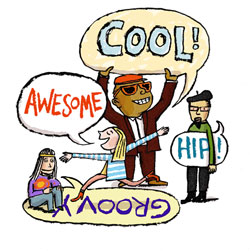 FOMO is an increasing “problem” for college students and other young adults. Interestingly, and somewhat ironically, FOMO seems to be a more chronic issue in a culture mediated by online social networks. So, what is FOMO? And do you have it?
FOMO is an increasing “problem” for college students and other young adults. Interestingly, and somewhat ironically, FOMO seems to be a more chronic issue in a culture mediated by online social networks. So, what is FOMO? And do you have it?
[div class=attrib]From the Washington Post:[end-div]
Over the past academic year, there has been an explosion of new or renewed campus activities, pop culture phenomena, tech trends, generational shifts, and social movements started by or significantly impacting students. Most can be summed up in a single word.
As someone who monitors student life and student media daily, I’ve noticed a small number of words appearing more frequently, prominently or controversially during the past two semesters on campuses nationwide. Some were brand-new. Others were redefined or reached a tipping point of interest or popularity. And still others showed a remarkable staying power, carrying over from semesters and years past.
I’ve selected 15 as finalists for what I am calling the “2011-2012 College Word of the Year Contest.” Okay, a few are actually acronyms or short phrases. But altogether the terms — whether short-lived or seemingly permanent — offer a unique glimpse at what students participated in, talked about, fretted over, and fought for this past fall and spring.
As Time Magazine’s Touré confirms, “The words we coalesce around as a society say so much about who we are. The language is a mirror that reflects our collective soul.”
Let’s take a quick look in the collegiate rearview mirror. In alphabetical order, here are my College Word of the Year finalists.
1) Boomerangers: Right after commencement, a growing number of college graduates are heading home, diploma in hand and futures on hold. They are the boomerangers, young 20-somethings who are spending their immediate college afterlife in hometown purgatory. A majority move back into their childhood bedroom due to poor employment or graduate school prospects or to save money so they can soon travel internationally, engage in volunteer work or launch their own business.
A brief homestay has long been an option favored by some fresh graduates, but it’s recently reemerged in the media as a defining activity of the current student generation.
“Graduation means something completely different than it used to 30 years ago,” student columnist Madeline Hennings wrote in January for the Collegiate Times at Virginia Tech. “At my age, my parents were already engaged, planning their wedding, had jobs, and thinking about starting a family. Today, the economy is still recovering, and more students are moving back in with mom and dad.”
2) Drunkorexia: This five-syllable word has become the most publicized new disorder impacting college students. Many students, researchers and health professionals consider it a dangerous phenomenon. Critics, meanwhile, dismiss it as a media-driven faux-trend. And others contend it is nothing more than a fresh label stamped onto an activity that students have been carrying out for years.
The affliction, which leaves students hungry and at times hung over, involves “starving all day to drink at night.” As a March report in Daily Pennsylvanian at the University of Pennsylvania further explained, it centers on students “bingeing or skipping meals in order to either compensate for alcohol calories consumed later at night, or to get drunk faster… At its most severe, it is a combination of an eating disorder and alcohol dependency.”
…
4) FOMO: Students are increasingly obsessed with being connected — to their high-tech devices, social media chatter and their friends during a night, weekend or roadtrip in which something worthy of a Facebook status update or viral YouTube video might occur. (For an example of the latter, check out this young woman “tree dancing“ during a recent music festival.)
This ever-present emotional-digital anxiety now has a defining acronym: FOMO or Fear of Missing Out. Recent Georgetown University graduate Kinne Chapin confirmed FOMO “is a widespread problem on college campuses. Each weekend, I have a conversation with a friend of mine in which one of us expresses the following: ‘I’m not really in the mood to go out, but I feel like I should.’ Even when we’d rather catch up on sleep or melt our brain with some reality television, we feel compelled to seek bigger and better things from our weekend. We fear that if we don’t partake in every Saturday night’s fever, something truly amazing will happen, leaving us hopelessly behind.”
[div class=attrib]Read the entire article after the jump.[end-div]
[div class=attrib]Image courtesy of Urban Dictionary.[end-div]

 Why do some words take hold in the public consciousness and persist through generations while others fall by the wayside after one season?
Why do some words take hold in the public consciousness and persist through generations while others fall by the wayside after one season?